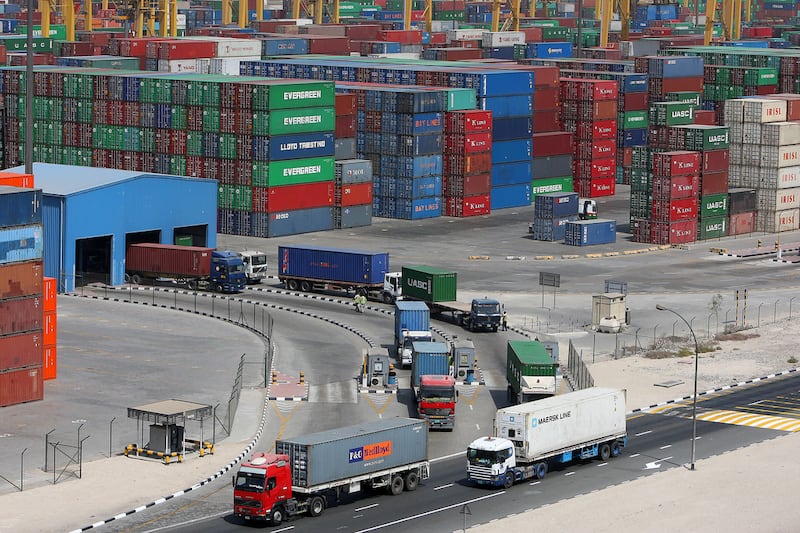The UAE’s non-oil foreign trade reached a record Dh2.23 trillion ($607.1 billion) last year, as the Arab world’s second-largest economy accelerates efforts to reduce its dependence on hydrocarbons and boosts its economic partnerships globally.
This was the first time the UAE’s non-oil foreign trade crossed the Dh2 trillion mark with values for the January-December period increasing more than 17 per cent compared to the same period in 2021.
“The UAE’s non-oil foreign trade has broken all records in 2022,” Dr Thani Al Zeyoudi, UAE Minister of State for Foreign Trade, said.
“Amid global challenges, the UAE has cemented our status as a major trading hub, a gateway to the world, and a global market … we will continue to work on extending our trade partnerships and help define the future of trade,” Mr Al Zeyoudi said.
China, Asia's largest economy, was the UAE's top trading partner during the period, with bilateral trade between the two countries at Dh264.5 billion. It was followed by India (Dh180.9 billion), Saudi Arabia (Dh135.2 billion) and the US (Dh110 billion).
Last year, the share of exports in the UAE's total non-oil trade rose to 16.4 per cent from 11.9 per cent in 2015, while the share of imports fell to 56.1 per cent from 61.2 per cent in 2015.
The share of re-exports reached 27.5 per cent of total non-oil trade, up from 26.9 per cent in 2015.
The UAE’s total exports value surged almost 6 per cent on an annual basis to Dh366 billion last year, from Dh265.5 billion and Dh240.1 billion in 2020 and 2019, respectively.
The UAE’s top commodities for re-export in 2022 included smartphones, diamonds, automotive parts and jewellery and gemstones.
“Our foreign trade … is accelerating … and our international economic relations are growing … and the investment, tourism and real estate demand for the UAE is achieving unprecedented numbers … and the UAE government will continue to provide the best environment for businessmen who accompany us on the historical growth journey of the UAE,” Sheikh Mohammed bin Rashid, Vice President and Ruler of Dubai, said in a tweet on Monday.
In 2022, the UAE signed its first Comprehensive Economic Partnership Agreement (Cepa) with India, one of the world’s fastest-growing economies, which helped propel bilateral trade to $38.6 billion in the first nine months of 2022 — almost double the figure recorded in the same period of 2020.
The Cepa with India came into effect on May 1. The benefits of Cepa include enhanced market access, lower or eliminated tariff rules, simpler customs procedures, clear and transparent rules and rule-based competition.
The countries are already on course to achieving $88 billion worth of trade in this financial year, Sunjay Sudhir, India’s ambassador to the UAE said last month at the India-UAE Partnership Summit in Dubai.
Last year, the UAE also signed Cepa accords with Indonesia and Israel, and is currently holding negotiations with Turkey, Georgia, Colombia and Cambodia.
The Cepa agreements with India, Israel and Indonesia are expected to expand the UAE’s economy by 2.6 per cent by 2030, Dr Al Zeyoudi said last year.
The UAE economy made a strong recovery from the coronavirus-induced slowdown and the pace of economic momentum has continued to improve on the back of government initiatives, higher oil prices, a strong performance in its real estate sector and a rebound in travel and tourism.
The UAE economy is estimated to have grown by 7.6 per cent last year, the highest in 11 years, after expanding by 3.9 per cent in 2021, according to the UAE Central Bank.
Overall, the country’s economy is projected to grow 3.9 per cent in 2023, according to the central bank.







